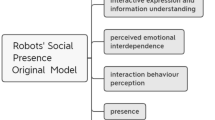Abstract
Previous work indicates that physical robots elicit more favorable social responses than virtual agents. These effects have been attributed to the physical embodiment. However, a recent meta-analysis by Li [1] suggests that the benefits of robots are due to physical presence rather than physical embodiment. To further explore the importance of presence we conducted a pilot study investigating the relationship between physical and social presence. The results suggest that social presence of an artificial agent is important for interaction with people, and that the extent to which it is perceived as socially present might be unaffected by whether it is physically or virtually present.
Access this chapter
Tax calculation will be finalised at checkout
Purchases are for personal use only
Similar content being viewed by others
References
Li, J.: The benefit of being physically present: a survey of experimental works comparing copresent robots, telepresent robots and virtual agents. Int. J. Hum-Comp. St. 77, 23–37 (2015)
Lee, K.M.: Presence, Explicated. Commun. Theor. 14(1), 27–50 (2004)
Pereira, A., Martinho, C., Leite, I., Paiva, A.: iCat, the chess player: the influence of embodiment in the enjoyment of a game. In: 7th International Conference on Autonomous. Agents and Multiagent System, IFAAMAS, pp. 1253–1256 (2008)
Kennedy, J., Baxter, P., Belpaeme, T.: Comparing Robot Embodiments in a Guided Discovery Learning Interaction with Children. Int. J. Soc. Rob. 7(2), 293–308 (2015)
Güth, W., Schmittberger, R., Schwarze, B.: An experimental analysis of ultimatum bargaining. J. Econ. Beh. Org. 3(4), 367–388 (1982)
Nitsch, V., Glassen, T.: Investigating the effects of robot behavior and attitude toward technology on social human-robot interactions. In: IEEE RO-MAN, pp. 535–540 (2015)
Lee, K.M., Jung, Y., Kim, J., Kim, S.R.: Are physically embodied social agents better than disembodied social agents? The effects of physical embodiment, tactile interaction, and people’s loneliness in human-robot interaction. Int. J. Hum-Comp. St. 64(10), 962–973 (2006)
Author information
Authors and Affiliations
Corresponding author
Editor information
Editors and Affiliations
Rights and permissions
Copyright information
© 2016 Springer International Publishing AG
About this paper
Cite this paper
Thellman, S., Silvervarg, A., Gulz, A., Ziemke, T. (2016). Physical vs. Virtual Agent Embodiment and Effects on Social Interaction. In: Traum, D., Swartout, W., Khooshabeh, P., Kopp, S., Scherer, S., Leuski, A. (eds) Intelligent Virtual Agents. IVA 2016. Lecture Notes in Computer Science(), vol 10011. Springer, Cham. https://doi.org/10.1007/978-3-319-47665-0_44
Download citation
DOI: https://doi.org/10.1007/978-3-319-47665-0_44
Published:
Publisher Name: Springer, Cham
Print ISBN: 978-3-319-47664-3
Online ISBN: 978-3-319-47665-0
eBook Packages: Computer ScienceComputer Science (R0)




